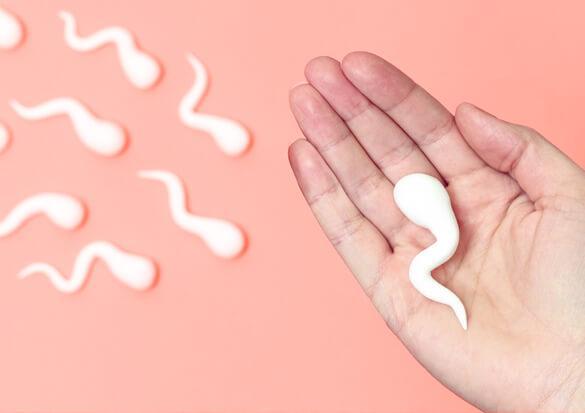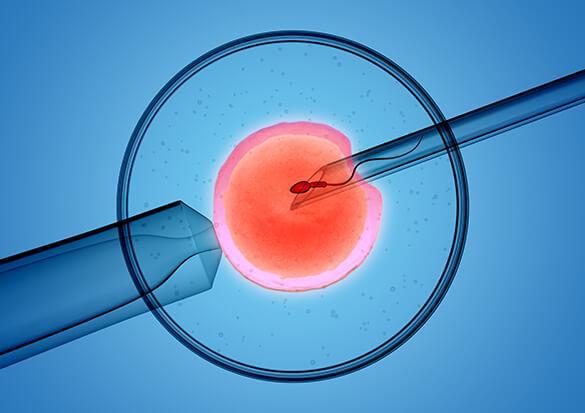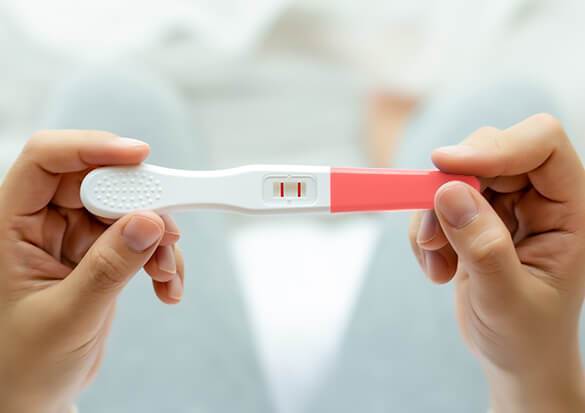What is infertility?
Infertility affects nearly one in seven couples. We look at what infertility is, how it is investigated and where to get support.
What is infertility?
Infertility is when a couple cannot get pregnant, despite having regular unprotected sex.
Fertility problems are not uncommon, and if you are struggling to conceive, you are not alone. Around one in every seven couples may have difficulty conceiving [1] and infertility affects both men and women equally.
There are two main types of infertility:
- Primary infertility – This is where someone who has never been pregnant is struggling to conceive.
- Secondary infertility – This is where someone who has previously had one or more pregnancies is now struggling to conceive again.
The chance of conceiving naturally reduces to 25% or less for couples who have been trying to conceive for three years or more. However, 80% of couples that have regular sex will have successfully become pregnant within a year [2].
It is essential to get help as early as possible if you are experiencing a delay in getting pregnant.
If you are under the age of 35 and have been trying to get pregnant for at least one year without success, then make an appointment to speak to your doctor.
If you are over 35 and have been trying to conceive for six months without success, then you can make an appointment with your doctor for a fertility investigation.
How is fertility investigated?
After you have made an appointment with your doctor, you may be worried about what happens next.
There are a few methods your doctor may use to investigate your fertility:
Blood tests
Blood tests are usually the first tests needed to investigate fertility. Your doctor can arrange the tests for you, or you may want to use private blood testing such as our range of Fertility Blood Tests.
The blood tests check different biomarkers depending on your age, gender, and symptoms. For women, the blood test may check your hormones to ensure that your levels are normal at different stages of your cycle.
For men, your doctor may check your testosterone levels. For women, the doctor may also check thyroid function.
Thyroid disorders can affect your hormones, and sometimes can be the cause of infertility in women.
You can read more about thyroid disorders in our Thyroid Guide.
Sperm test
After you have the results of your blood tests, men may have a sperm test (also known as a semen analysis).
This analysis checks the quality and quantity of sperm. The results are usually available within one week. Once you have your results, your doctor will discuss the results with you.
The World Health Organisation (WHO) reference values for sperm health are [3]:
- Semen volume: 1.5ml or more
- pH: 7.2 or more
- Sperm concentration: 15 million sperm per ml or more
- Total sperm number: 39 million sperm per ejaculate or more
- Total motility (percentage of progressive motility and non-progressive motility): 40% or more motile or 32% or more with progressive motility
- Vitality: 58% or more live sperm
- Sperm morphology (percentage of normal forms): 4% or more
If your sperm test is abnormal, your doctor may advise lifestyle changes such as reducing alcohol and not smoking. Or you may want to consider supplements that could help improve the quality of sperm.
Read more about positive lifestyle changes to help increase your chances of conception on our how can I increase my chances of conception page.
If you do choose to make some lifestyle changes, re-testing can help you to see whether they are having a positive impact on your health. Once you re-test, if your second sample remains abnormal, then it is likely that you will be referred to a specialist to discuss what this means for you and your fertility journey.
Scans
As part of investigations, women may be referred for a scan of the pelvis. A pelvic scan looks at your female organs like your uterus, fallopian tubes, and ovaries.
The scan can identify any concerns that may need further investigations, such as indications of Polycystic Ovary Syndrome (PCOS).

Sexual health
One of the biggest causes of male and female infertility is a sexually transmitted infection (STI) [4]. Because of this, it is important to consider your sexual health when trying to conceive.
Your risk of having an STI is higher if you have had multiple partners in the past, or have not used barrier methods of contraception, such as condoms. If you have an STI, you may not show symptoms, so you may not know if you have one. Therefore, when you decide to start a family, it is a good idea for you both to visit your doctor or local sexual health clinic, to have a sexual health screening.
Alternatively, you can buy a wide range of private sexual health checks. These simple, at-home tests can check for the most common STIs that can cause infertility, such as chlamydia and gonorrhoea.
If you have an infection, it is possible to treat it with antibiotics. This reduces the chances of any damage occurring to your pelvic organs, which can sometimes make it more difficult to conceive.
Referral to fertility specialists
If the investigations you or your partner have with your doctor identify any concerns, or if you have still not conceived, then your doctor may arrange for you both to be referred to a fertility specialist. Once referred, you may have further testing.
If a cause for your infertility is found, or if you have still not conceived naturally, you will likely discuss the next steps such as IVF or assisted reproduction medication.
Read more about fertility treatments on our what treatments can help me to conceive? page.
You can also read more about what causes infertility on our main causes of female and male infertility pages.
Where can I get support with infertility?
Struggling to conceive, or going through fertility treatments, can be very hard. It is normal to feel sad, frustrated, or angry.
It is essential to build a good support network around you. Family and friends are an important part of your journey and can help support you on difficult days. There are also many places you can go to for support and information.
Fertility professionals and charitable organisations:
- The Fertility Network UK– A national charity for anyone who is, or has, experienced fertility problems. They offer resources, news, and information on their website, as well as a support line to answer your questions directly and have details of local support groups close to you.
- The Human Fertilisation and Embryology Authority (HFEA) – The Government regulator for fertility clinics. The HFEA website also provides impartial information on UK fertility clinics, fertility treatments, and egg and sperm donation.
- The Daisy Network – A charity dedicated to supporting women with Premature Ovarian Insufficiency (POI). They provide a network of people to talk to, advice on treatments available, and keep you updated on research in Hormone Replacement Therapy (HRT) and assisted conception. If you become a member, you will receive benefits such as access to The Daisy Network Forum and their closed Facebook group, access videos and live chat, factsheets, and much more.
- The Donor Conception Network – A network that offers specialist support, local support groups and, advice and information for anyone considering using a donor to create their family.
Fertility blood tests
Whether you are trying for a baby now or thinking about trying in the future, we have several fertility tests for each stage of your fertility journey.
Have a look at our range of Fertility Blood Tests, or, if you are unsure which test is best for you, go through our handy Fertility Blood Test Buying Guide or try our test finder.
References
- NHS choices. NHS. Available at: https://www.nhs.uk/conditions/infertility/ (Accessed: November 18, 2022).
- Dunson DB, Baird DD, Colombo B [2004]. Increased infertility with age in men and women. Obstetrics and Gynecology 103: 51–6).
- World Health Organization Reference Values for human semen ... - who.int . Available at: https://www.who.int/reproductivehealth/topics/infertility/cooper_et_al_hru.pdf?origin=publication_detail (Accessed: November 18, 2022).
- Sexually transmitted infections (stis) (no date) World Health Organization. World Health Organization. Available at: https://www.who.int/news-room/fact-sheets/detail/sexually-transmitted-infections-(stis) (Accessed: November 18, 2022).
Related tests
If you’re hoping to start a family or simply want to understand more about your reproductive health, our Day 3 Fertility Blood Test provides valuable insights into your ovarian reserve and hormone balance
- Results estimated in 2 working days
- 3 biomarkers
Finger-prick or Venous collection
Select testTake control of your health with our best-selling female health check
- Results estimated in 3 working days
- 47 biomarkers
Venous collection
Select testStay on top of your game with our advanced blood test for men
- Results estimated in 3 working days
- 44 biomarkers
Venous collection
Select testGet detailed insights into your thyroid function, including antibodies and nutrients essential for optimal thyroid health
- Results estimated in 2 working days
- 10 biomarkers
Finger-prick or Venous collection
Select testAre you experiencing symptoms of PCOS like irregular periods, excess facial hair, or oily skin? Perhaps you’ve been diagnosed with PCOS and want to check your cholesterol levels and diabetes risk
- Results estimated in 4 working days
- 19 biomarkers
Venous collection
Select test






